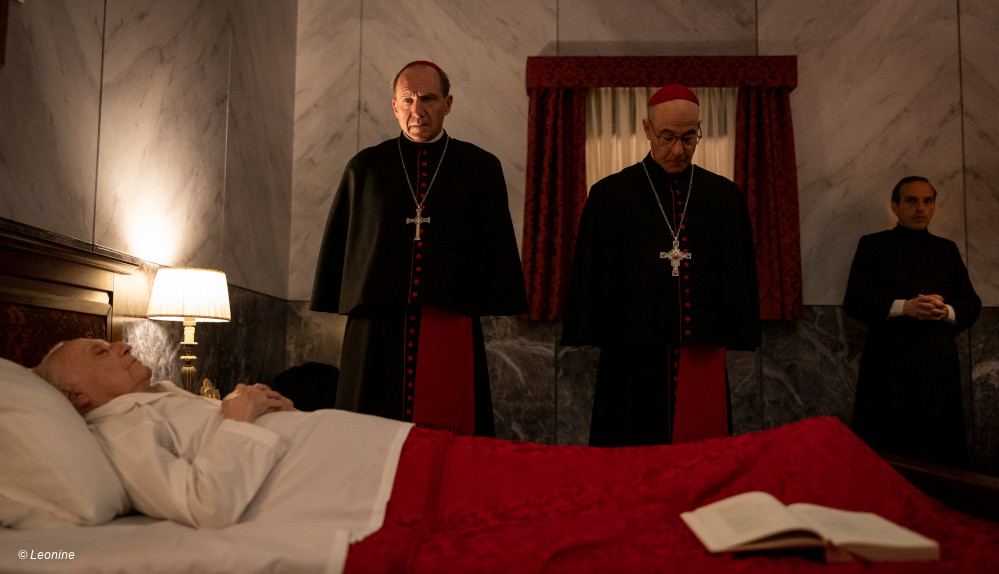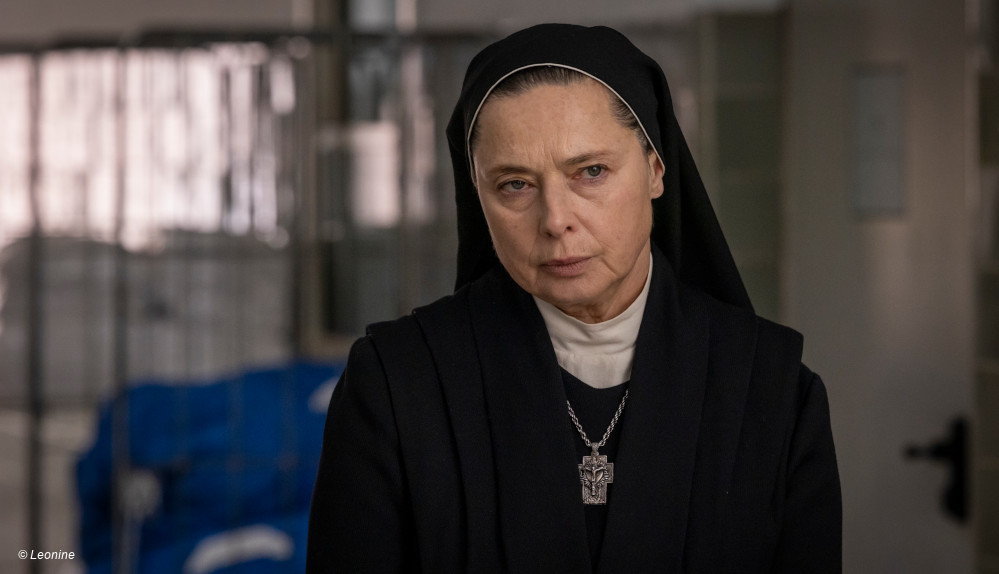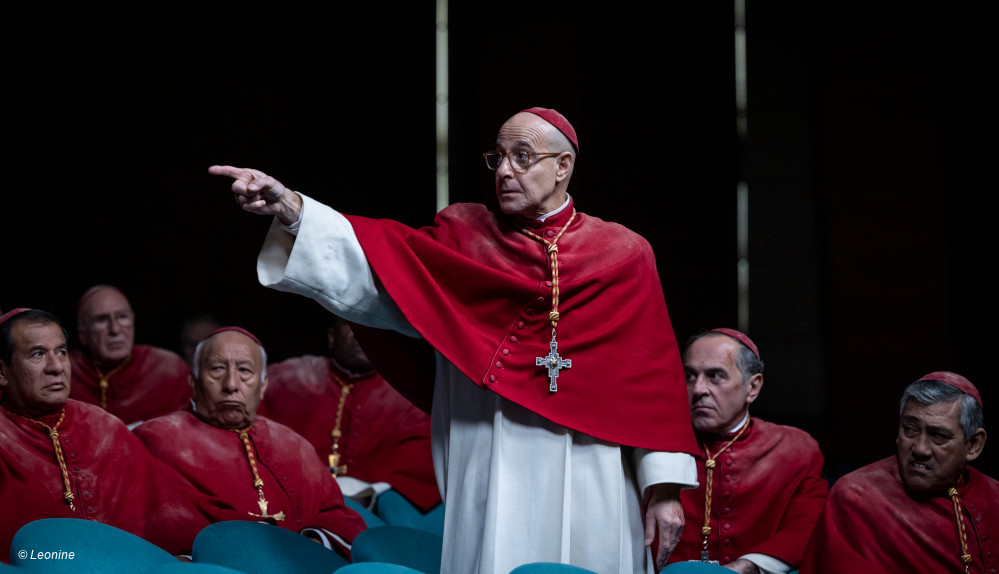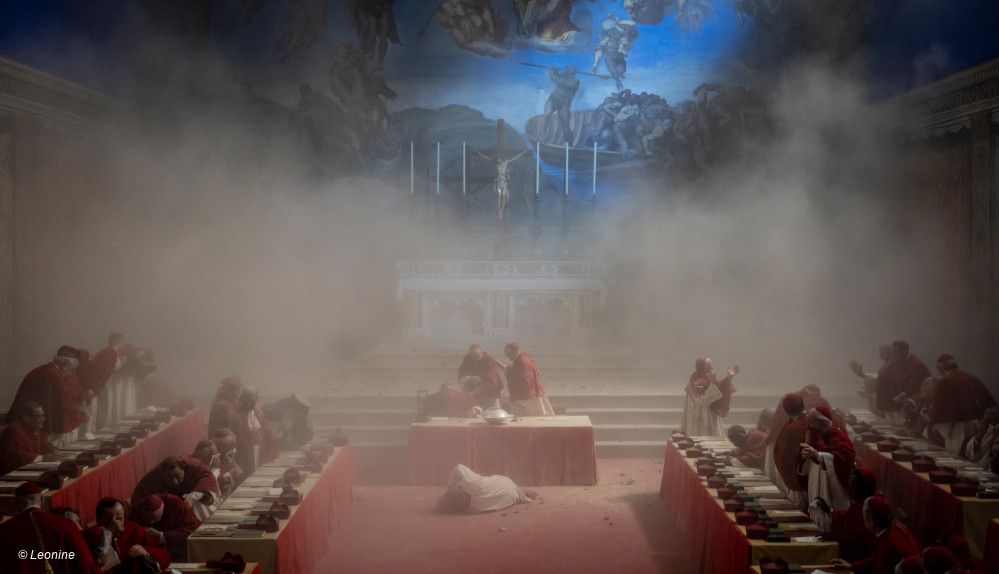The director of “All Quiet in the West” takes a look at the power struggles over the Holy See in the Oscar contender “Conclave.”
The Holy Father’s body wobbles on the bier. All that remains of the representation and vicariousness of Christ is the dead body, which is transported away at the beginning of “Conclave”. Even these first minutes of Edward Berger’s new film strive to make the gravity and height of the events shown become palpable. The outstanding, sometimes effervescent, sometimes deeply grumbling orchestral music by Volker Bertelmann, who already wrote the score for Berger’s “Nothing new in the West“ composed, plucks and bows menacingly. With her pointed dissonances and staccato caesuras, she translates the uncomfortable core, mechanics and downward spiral on the screen into sounds.
A set of wheels sets in motion during assembly. Scenes are being prepared and final safety checks are being carried out. Vatican protocol spelled out exactly what needed to be done. Everyone was assigned their role. Now they are vying for the Holy See and the office of Pope. Cardinal Lawrence, played by Ralph Fiennes, who can express the full weight of his work in piercing, tortured looks, is supposed to lead the conclave.

Scheming game for the election of the Pope
Cardinals from all directions come to Rome to elect the new head of the church behind closed doors. The blinds that slide down on the windows to shield these rooms from the outside world and darken them symbolically make it clear how much this choice is like a prison in which the holy is not so holy and the human mistakes outweigh themselves the cardinals want to admit first.
It is an experimental setup in an isolated setting that shows “Conclave” over two hours. You’re just waiting for an escalation between the men. How they lose their composure and their facade collapses. Little by little, the intrigues, power struggles and secret cheating come to light. Even the deceased pontiff seems to be involved from the afterlife. The audience is told early on that he was always several moves ahead of his opponents in the game of chess. A war in which he has to choose a side is what Lawrence hears from his confidant, Cardinal Bellini (Stanley Tucci), in whom he sees a reluctant bearer of hope.

“Conclave” looks behind the facade of the church
“Conclave” is based on the one of the same name Roman von Thomas Harris. The thriller is already considered a hot candidate for the upcoming Golden Globes and Oscars. Rightly so! It’s not just captivating because of its impressive actors. Stars like Stanley Tucci, Ralph Fiennes and Isabella Rosselini, who shines in a small but striking supporting role as Sister Agnes, play here less sophisticated human characters than performed roles. After all, representation is the central theme of the film. They represent a dispute over direction and a tactic with internal and external expectations when it turns out that the fight for the status of the head of the church is not very different from the intrigues of secular politics that can currently be experienced worldwide.
Series like “House of the Dragon”, “Dune: Prophecy” and films like “Conclave” create a dark reflection of these power struggles, which are bitterly fought between lobbyism, betrayal, self-interest and narcissism. They deal with widespread disillusionment and skepticism regarding today’s democratic processes and political administration processes. Edward Berger’s film production demonstrates above all an eye for the pompous productions and orders that take place in the Vatican. Whether it’s objects, props that are draped on tables in the chapel, or the marches and meetings of the cardinals, which cameraman Stéphane Fontaine translates into impressive light-dark contrasts: his images unfold enormous beauty on the screen in the severity of their nature Composition.

Appearance and being in the Vatican
The competition for the greatest possible appearance, which is supposed to conceal existence, is also written into the aesthetics of the film. And perhaps the images lack a bit of fragility and self-reflection. They remain highly controlled and graceful even in the greatest chaos that will eventually erupt for a brief moment. Superficial, you could also call it.
In this moment of chaos, in the sealed-off cosmos of “Konklave,” there is suddenly a permeability between the separate spaces, between the inside and the outside. At the latest, this chamber play, presented pathetically and with great dramatic gestures, makes its abstraction clear, which is less about the crises of the religious order than the political crises of the present in general. “Conclave” is more than just a criticism of the artificial rituals and hypocrisy of the Catholic Church.

“Conclave” is recommended as an Oscar candidate
In the ongoing aftermath of the Second Vatican Council, the role of women, sexual orientations, gender, the form of the liturgy and the treatment of people of other faiths are being debated here, while violence and attacks are causing a stir in the outside world. It’s about everything, this film suggests. Beyond the Vatican. Liberal forces should unite here to prevent the rise of reactionary forces. The parallels and allusions to the present are obvious. This is clearly translated into game scenarios and repeatedly refers to its own references so that even the last person in the cinema understands it. And perhaps some of it suggests more substance than is ultimately lurking in the dialogue. But it is also highly entertaining, entertaining and thrilling to watch! At the latest in the final polemic, which confronts the old structures with their own irrational enemy image from within.
And “Conclave” offers a number of great individual moments that will remain in the memory of this cinema year because they are so pointedly written, edited and directed. For example, when Ralph Fiennes formulates a warning plea for doubt as the nucleus of faith in his character’s opening speech. It points both to the transcendent and to the lies and truths that lie right in front of you. Cut: There they sit, the older men, staring sternly and suspiciously.
“Konklave” will be shown in German cinemas from November 21, 2024, distributed by Leonine.
Notice: Some links are affiliate links. If you purchase via this link, DIGITAL TELEVISION receives a small commission. This has no effect on the price.
Source: www.digitalfernsehen.de


